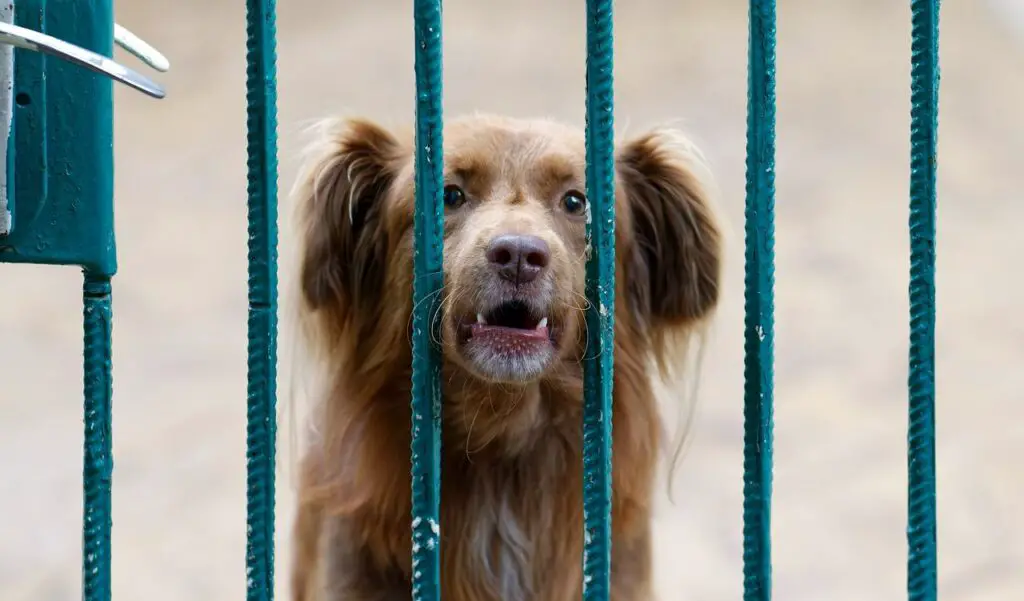9 Reasons Why Dog Barking in The Crate at Night All of a Sudden
We all feel relaxed when our dog sleeps at night without making any noise! Even this gives us happiness and makes us feel happy, too. But what if your crate-trained dog suddenly starts barking at night? Isn’t it frustrating?
Sleep disturbance due to dog barking is common for all dog owners. However, Have you ever thought about the reasons behind it? Why do they bark even after crate training?

This post may contain affiliate links. If you buy something through one of those links, you won’t pay any extra penny, but I’ll get a small commission that encourages me to deliver more helpful content for you.
Let us inform you that behind this peculiar behavior of your dog, there may be underlying issues that need to be identified and carefully addressed.
One of the main reasons for your dog’s barking issue is anxiety. It has been observed that dogs that remain anxious are the ones who make noises at night even after getting training to remain calm. Sometimes, crate-trained dogs feel uncomfortable because of the size of the crates.
In some cases, it has been noticed that dogs with Cognitive Dysfunction Symptoms bark at night. CDS is a mental issue. In this condition, one cannot remember things for long, or their mental ability gets disrupted! Unfortunately, this symptom has been noticed in elderly dogs only.
Whether your dog is barking at night for discomfort or other reasons, you must identify the exact reason and consult your veterinarian. As pet owners, we always want to know the reasons behind any abnormal behavior of our dogs, and we often remain worried. When we faced this problem with our pet, Jack, we consulted with our veterinarian for a clear justification.
In this article, we are sharing those possible reasons behind the barking issue of your crate-trained dog, and we will also share some easy ways to calm your dog down.
Table of Contents
The reasons behind your dog’s barking habits:
Discomfort:
Crate training is one of the best ways to assign a dog to its actual place. But when you choose a crate that is not the ideal size for your dog, then it may give your dog discomfort! So, out of uneasiness, your dog may start barking at night.
Boredom:
Boredom not only makes us feel gross, but it also makes our pets annoyed! Most crate-trained dogs remain in the crates throughout the day, making them lazy and bored! So, probably at night, dogs start barking when they feel lonely and bored.
Urination Call:
Most crate-trained dogs become habituated to stay in crates all the time. Even when they need to pee or poo, they need support from their owners. In the daytime, we try to keep our pets beside us, but we leave them in the crate at night. So, at night, when they need to go pee, they start barking to get the attention of their owners.
Fear:
Sometimes, dogs become restless at night and start baking by listening to unknown sounds. When animals hear unfamiliar sounds, they initially suspect it is dangerous, so they start barking.
So, to rule out this problem, we have to reduce the sounds that annoy dogs. Sometimes, avoiding the outer sound is impossible; in those cases, we have to move the puppy crate to a place where those sounds are minimal. It is suggested to move the puppy crate out of the bedroom to a place where your puppy will not get disturbed while sleeping at night.
New place:
If you bring a puppy to your home in the initial days, it may take him time to adjust to the situation. To adapt to a new culture, ambiance, and neighborhood, puppies need a fair amount of time. It has been seen that newly brought puppies bark at night because of these reasons. But over time, they gradually cope up with the situation and do not bark at all.
Injury:
It may be because of injury if you see your dog whining in a crate during sleep. Injury is one of the reasons dogs bark at night. If your dog has undergone a medical injury and is still recovering, then a crate may not be an ideal place to put him in.
Crates do not offer enough space to spread legs. Some injuries may heal when they are exposed to air or sunlight. But in a crate, dogs cannot spread their limbs properly. As a result, their injury does not heal easily. At night, when dogs try to stretch their limbs to relax and find insufficient space, they feel annoyed and start making noise.
Separation anxiety:
Dogs love to be surrounded by their loved ones. But when we keep them away from us, they start to feel lonely. We noticed this when we had an issue with Jack. At night, we usually keep Jack in his crate.
When we brought Jack to our home, we saw Jack remain silent and happy during the day, but at night, when we left him in the crate, he used to bark without any reason. We later understood that it was because of separation anxiety.
Like a human, a dog also builds affection with their master. When they are left alone, they become grumpy and seek attention from their masters. Puppies, especially those who have recently experienced separation from their littermates, may go through separation anxiety, which can lead to excessive barking when confined in a crate.

Elderly dogs:
It has been noticed that elderly dogs bark at night because of body pain. Arthritis is one of the main reasons why elderly dogs bark at night. Elderly dogs remain calm, and their body movements become so low that arthritis pain becomes a daily issue for old dogs. Due to this body pain, dogs remain anxious and bark out of pain.
Crate anxiety:
Calming an anxious dog at night is not easy if your dog has anxiety issues. Sometimes dogs are not habituated to staying inside the crate for a long time. When we put them in the crate, it becomes difficult for him to remain calm all the time inside the crate. Out of anxiety, your dog may start barking. To handle this disruptive crate behavior, you must find out the exact cause behind this barking issue.
Puppies and elderly dogs are most difficult to crate trained. In the beginning, you might find this Crate training challenge. Your puppy may not want to get into the crate, but this anxiety will go away over time.
How do you detect the issues and calm down your dog?
If you see your dog barking inside the crate at night, there must be some difficulty. You must be very careful with your dog’s behavior to determine why.
Check out the reason for discomfort:
If your pal is barking inside the crate at night, check the reason first. Whether your pal is making a sound out of discomfort because of a shortage of space in the crate or if there is some injury in your dog’s body, check that and consult with your vet as soon as possible.
Many dog owners often overlook these issues. Internal injuries are not visible to the naked eye, so persistent barking may be a sign that your furry companion requires careful attention. Always keep an eye out to find out the reason behind this midnight crying. If your dog barks regularly, then take him to the nearest veterinarian.
Fight boredom:
Seeing that your dog remains gloomy all day but barks at night means it is doing this out of boredom. Try to play around during the daytime. Burn his energy so he will get tired at night and fall asleep early.
It has been noticed that most crate-trained puppies become idle. As a result, out of boredom, your puppy may bark in crates at bedtime. As pet owners, you must notice this. If you see your dog remains gloomy, try to entertain and play with him. Taking him out for a walk will make your dog agile and spontaneous.
Nighttime crate training issues:
Before placing your dog in the crate for the night, ensure that your dog has an opportunity to relieve itself. So when you are not around him, he will not cry because of the toilet break. It is always suggested to train the dog where to pee. If you train your dog for its pee time, it becomes easier for them to hold the bladder for extra hours. So it will not start crying out of emergency all of a sudden.
Dog barking in crates at night is normal, but if it happens repeatedly, It is always suggested to train your dog for pee and poo time. Animal behaviorists say dogs trained for toilet timing remain calm in stressful situations.
Address new sounds:
when dogs hear a new kind of sound, they suspect those sounds are intruders. As a result, they start baking to let their master know something is wrong. But most of the time, dogs cannot decide which is a normal sound and which is not. So, try to introduce your dog to normal sounds that should not be addressed as an intruder’s sound.
Conclusion
Dealing with a barking dog at night all of a sudden is annoying. Most pet owners find this situation odd and frustrating. It’s quite tough to deal with the situation, but as pet owners, we must keep patience and understand the underlying cause behind this odd behavior of your dog.
First, we must find the exact cause behind this barking issue with your dog. Once you discover the exact cause, you must analyze whether it is treatable at home. If this issue is related to crate size or discomfort, try fixing it. If you cannot find the cause, then it is suggested to consult with the veterinarian as soon as possible.
It is suggested not to shout or give punishment to dogs if you find them shouting at midnight without any reason. Sometimes, we cannot see the reason then, and we should remain calm and deal with the situation more diligently.
In the end, barking is an instinct of dogs. To understand the situation, first try to find out the reason and try to solve the issue. If you cannot do anything on your own, try to consult a dog behaviorist.
FAQs:
1. What should I do if my dog has never barked in the crate at night but suddenly starts doing so?
A: If your dog never barked in the crate at night but suddenly starts barking, first ensure there are no medical issues causing discomfort. If possible, give your dog crate training again.
2. How can I differentiate between attention-seeking barking and genuine distress in the crate at night?
A: Differentiating between attention-seeking barking and genuine distress in a crate at night can be challenging. To discern the two, pay close attention to behavioral changes, body language cues, and the frequency of barking.
3. Are there any products or tools that can help manage my dog’s sudden crate barking at night?
A: Many products on the market can calm down your puppy at night easily. Adaptil, puzzle toys, and chewable toys are the best among all those products. These products are effective in reducing dog anxiety during the night.
4. How long does it typically take to resolve sudden crate barking issues in dogs?
A: It depends upon your dog’s situation, behavioral pattern, and anxiety level. If your dog is barking in the crate after the crate training, there may be other reasons for this behavior, so you need to identify and address the underlying issue. Once you resolve the issue, your dog will become calm and composed.





